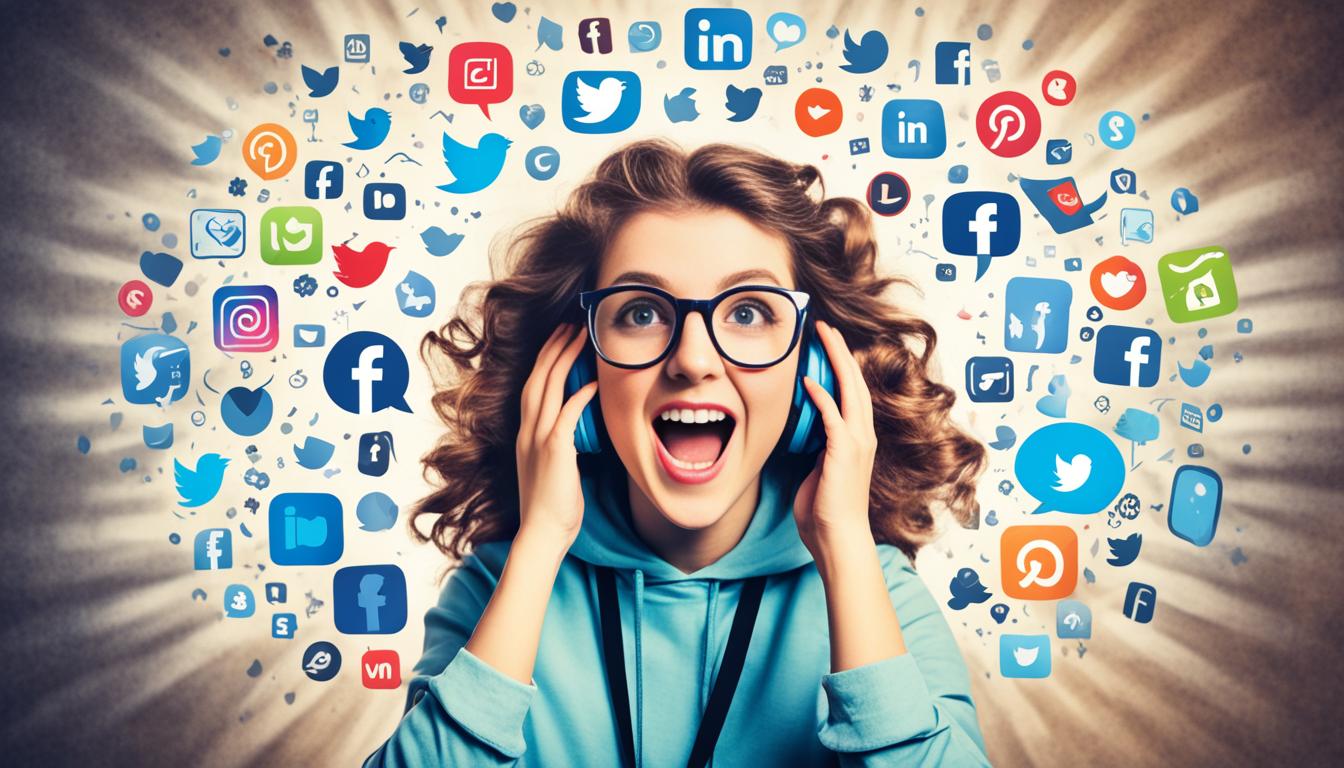Understanding Why Teens Use Social Media Today
Social media has become an integral part of teenagers’ daily lives, with many adolescents spending a significant amount of time engaging with various platforms. But why do teens use social media? Understanding the motivations behind teen social media use is crucial in order to address the benefits, risks, and impact it has on their mental health and overall development.
The benefits of social media for teenagers are vast. It provides a platform for social connection, allowing teens to maintain and form friendships, especially in an increasingly digital world. Social media also promotes positive socialization, particularly for teenagers who may struggle with face-to-face interactions. It offers opportunities for expanding knowledge and interests, developing thinking and writing skills, and keeping up-to-date with current events and issues.
However, social media also poses risks for teenagers. The risks of social media for teenagers include exposure to inappropriate content, cyberbullying, negative impacts on body image and self-esteem, and peer influence on risky behaviors. Excessive social media use can contribute to mental health issues such as depression and anxiety.
As parents and guardians, it is essential to promote safe and responsible social media use among teens. Strategies such as setting guidelines and boundaries, monitoring activities, and maintaining open communication can help ensure that teenagers navigate social media in a healthy manner. By striking a balance between the benefits and risks of social media, we can support our teens in harnessing the advantages of technology while mitigating potential harm.
Key Takeaways:
- Teenagers use social media for social connection, self-expression, knowledge expansion, and staying informed.
- Benefits of social media for teenagers include fostering friendships, promoting positive socialization, and serving as a platform for learning and exploration.
- Risks of social media for teenagers include exposure to inappropriate content, cyberbullying, negative impacts on mental health, body image issues, and peer influence on risky behaviors.
- Strategies to promote safe social media use among teens include setting guidelines, monitoring activities, maintaining open communication, and being a responsible role model.
- Parents play a crucial role in monitoring and guiding their teen’s social media activities to ensure their well-being and safety.
The Healthy Effects of Teen Social Media Use

Social media holds numerous benefits for teenagers, contributing positively to their mental health and well-being. By engaging in healthy social media use, teens can experience various advantages that can enhance their lives and support their emotional and social development.
Creating Online Identities and Building Social Networks
One of the key benefits of social media for teens is the opportunity to create online identities and build social networks. Through platforms like Instagram and Facebook, teenagers can express themselves, share their interests, and connect with like-minded individuals. This sense of belonging and connection can significantly boost their self-esteem and overall mental well-being.
Support Networks on Social Media
Teens who lack social support offline or are going through challenging times can find solace and support through social media. Online communities provide a safe space where adolescents can connect with others who share similar experiences, whether it be coping with mental health issues, struggling with their identity, or dealing with societal pressures. These support networks foster a sense of belonging and provide emotional validation and encouragement.
Coping Strategies and Resources
Social media platforms offer opportunities for teenagers to learn and develop coping strategies for challenging situations and mental health conditions. Moderated chat forums, such as online support groups, allow teens to share their stories, seek advice, and gain insights from others who have faced similar struggles. This online support can provide valuable guidance, encouragement, and resources for managing their mental health effectively.
Seeking Help for Mental Health Conditions
Social media can also serve as a platform for seeking help and support for mental health conditions. Many organizations and mental health professionals maintain a presence on platforms like Twitter or YouTube, providing information, resources, and access to mental health services. Teens can reach out to these professionals and communities for guidance, validation, or professional help when needed.
“Social media support networks can be a valuable resource for teenagers who lack social support offline or are experiencing challenging times.”
Overall, when used in a healthy and responsible manner, social media can offer significant benefits for teenagers. From building social networks to finding support and coping strategies, it can positively impact their mental health and provide avenues for growth and self-expression.
The Unhealthy Effects of Teen Social Media Use
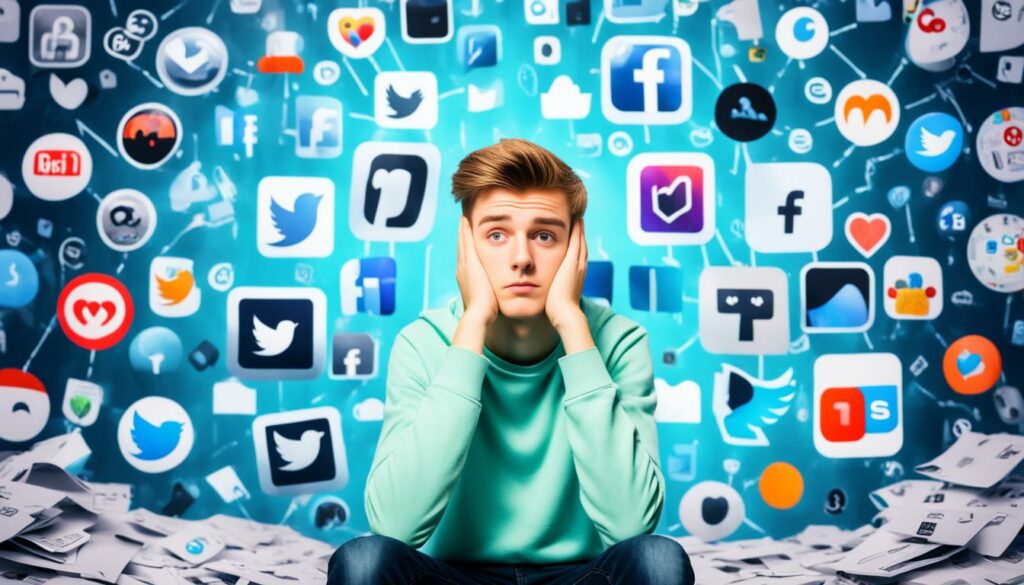
Social media can have both positive and negative effects on the mental health and well-being of teenagers. While it serves as a platform for connecting with others and accessing information, unhealthy social media use can lead to various negative consequences. It is crucial for parents and caregivers to be aware of these risks and take necessary steps to promote safe and responsible social media use among teens.
Distractions from Offline Activities
One of the negative effects of excessive social media use is the distraction it creates from offline activities. Teens may spend excessive amounts of time on social media, neglecting important tasks such as homework, exercise, and quality family time. This can have adverse effects on their academic performance, physical health, and overall well-being.
Disruption of Sleep
Spending long hours scrolling through social media feeds, especially late at night, can disrupt teens’ sleep patterns. The exposure to screens and engaging with stimulating content can make it difficult for them to unwind and fall asleep. This lack of quality sleep can affect their mood, cognitive function, and overall mental health.
Biased or Incorrect Information
Social media platforms are vast sources of information, but they are not always reliable. Teens may come across biased or factually incorrect information, leading to misconceptions and misunderstandings. This can contribute to the development of distorted beliefs or opinions, potentially impacting their mental well-being and decision-making abilities.
Spreading Rumors and Sharing Personal Information
Teens may engage in the spread of rumors or participate in oversharing personal information on social media platforms. This can lead to negative social consequences, such as damaged relationships, cyberbullying, and invasion of privacy. It is essential to educate teens about the potential risks and encourage responsible online behavior.
Unrealistic Views of Others’ Lives and Bodies
Social media can paint an idealized and unrealistic picture of others’ lives and bodies. Teens may compare themselves to these unrealistic standards, leading to feelings of inadequacy, low self-esteem, and body image issues. It is crucial to promote a healthy perspective on social media, emphasizing the importance of self-acceptance and individuality.
Online Predators and Cyberbullying
Teens are susceptible to encountering online predators and becoming victims of cyberbullying on social media platforms. These negative experiences can have severe psychological and emotional consequences, including anxiety, depression, and even self-harm. It is vital for parents and caregivers to educate teens about online safety, privacy settings, and the importance of reporting any inappropriate or harmful behavior.
Self-Harm and Negative Posts on Social Media
Social media platforms can become spaces where teens express distress and negative emotions, including self-harm thoughts or behaviors. Exposure to such content can be triggering and have a detrimental impact on vulnerable individuals. It is crucial to provide support and compassionate interventions for those who display signs of distress on social media.
The Link Between Time Spent on Social Media and Mental Health Risks
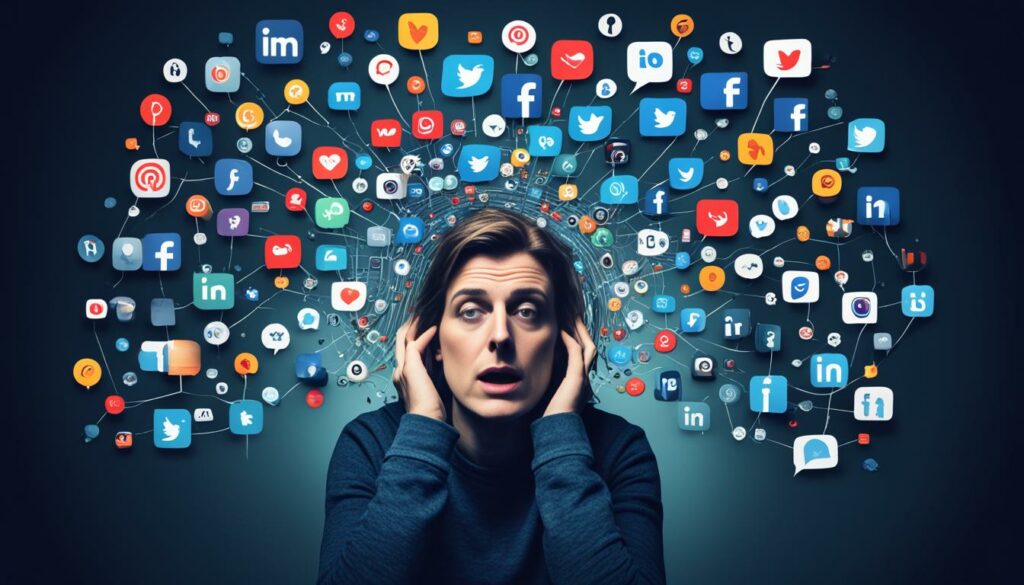
Research suggests that the amount of time teens spend on social media can have an impact on their mental health. Several studies have explored this relationship, shedding light on the potential risks associated with excessive social media use.
One study conducted in the United States focused on 12- to 15-year-olds and found that spending three hours a day on social media was linked to a higher risk of mental health concerns. The study highlighted the importance of monitoring and managing the time teens spent on these platforms to protect their mental well-being.
Another study conducted in England specifically examined the social media use of 13- to 16-year-olds. The findings revealed that using social media more than three times a day predicted poor mental health and well-being among the participants. This study emphasized the need to establish a healthy balance between online activities and other aspects of life for optimal mental well-being.
However, it is important to note that not all research has found a significant link between time spent on social media and mental health risks in teens. Different studies may yield varied results due to various factors such as study design, sample size, and measurement methods.
Overall, these studies highlight the importance of understanding the impact of social media use on teen mental health and the need for responsible and balanced engagement with online platforms.
| Study | Age Group | Findings |
|---|---|---|
| US Study | 12- to 15-year-olds | Three hours a day on social media associated with higher mental health risk |
| England Study | 13- to 16-year-olds | Using social media more than three times a day predicted poor mental health and well-being |
The Importance of Content and Sharing on Social Media

The content that teens encounter on social media has a significant impact on their mental health. Certain types of content can be risky and harmful, posing dangers to vulnerable individuals. For instance, content depicting illegal activities, self-harm, eating disorders, or harmful habits can increase the risk of mental health issues, especially for teens who are already struggling with their mental well-being.
Moreover, discrimination, hate speech, and cyberbullying prevalent on social media platforms can further contribute to anxiety and depression among teens. Experiencing such negative content and interactions online can have a detrimental effect on their mental health and overall sense of well-being.
It’s also important to consider the content that teens themselves share on social media. Impulsive or inappropriate posting can have serious consequences, including bullying, harassment, or even blackmail. Sharing personal photos and stories online can inadvertently expose teens to risks and vulnerabilities, compromising their privacy and safety.
The Impact of Content on Social Media
“The type of content that teens are exposed to on social media plays a significant role in their mental health and well-being.” – Dr. Emma Johnson, Child Psychologist
As teens navigate the digital landscape, it is crucial for them to be mindful of the content they consume and share. By staying aware of the potential risks associated with certain content and engaging in responsible online behavior, teens can protect their mental health and promote a safer online environment.
| Type of Content | Mental Health Risks |
|---|---|
| Illegal acts | Potential normalization and imitation of harmful behavior |
| Self-harm and eating disorders | Increase in self-destructive behaviors and negative body image |
| Discrimination and cyberbullying | Anxiety, depression, and decreased self-esteem |
| Stress posting | Overexposure of personal struggles and emotional distress |
| Sharing personal photos and stories online | Privacy infringement and vulnerability to exploitation |
It is essential for parents, educators, and society as a whole to promote digital literacy, guide teens in making healthier content choices, and foster a supportive online environment free from discrimination and cyberbullying. By doing so, we can create a safer digital space for teenagers to explore and share their lives while safeguarding their mental well-being.
Strategies to Promote Safe Social Media Use Among Teens
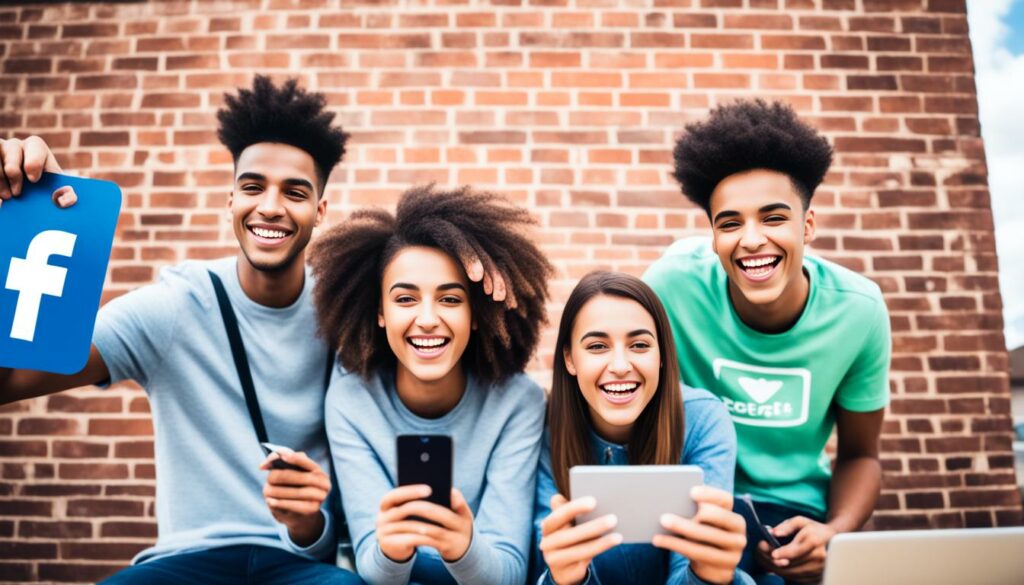
Ensuring safe social media use among teens is a responsibility that parents can take on. By implementing the following strategies, parents can help their teens navigate the online world responsibly and protect their mental well-being.
- Setting rules and limits: Clearly define the boundaries for social media use, including time restrictions, content guidelines, and appropriate platforms.
- Being a parental example: Demonstrate positive online behavior by using social media responsibly and ethically. Show your teens how to engage in respectful discussions and avoid negative interactions.
- Managing challenging behaviors: Monitor and address any concerning behaviors such as excessive screen time, cyberbullying, or sharing personal information. Teach your teens how to handle difficult situations online.
- Turning on privacy settings: Help your teen understand the importance of privacy by enabling strict privacy settings on their social media accounts. This ensures that their personal information is only visible to trusted individuals.
- Monitoring and reviewing teen accounts: Regularly check your teen’s social media accounts to ensure they are adhering to the established rules and guidelines. This allows you to address any potential issues promptly.
- Having regular talks about social media: Initiate open and ongoing conversations about the impact of social media on your teen’s mental health. Discuss the potential risks and benefits, and provide guidance on responsible usage.
- Being a role model: Show your teen the importance of maintaining a healthy balance between online and offline activities. Encourage activities that promote face-to-face interaction and interpersonal relationships.
- Explaining what’s not okay: Educate your teen about the types of content and behaviors that are inappropriate or harmful. Teach them how to recognize warning signs and report any concerning incidents.
- Encouraging face-to-face contact: Emphasize the importance of connecting with friends and family offline. Encourage your teen to engage in activities that promote in-person socialization and strengthen real-world relationships.
- Seeking professional help if needed: If you notice signs of mental health issues or excessive dependence on social media, don’t hesitate to seek help from a mental health professional. They can provide valuable support and guidance.
By implementing these strategies, parents can play an active role in promoting safe social media use among teens. Open communication, parental guidance, and monitoring are key to ensuring that teens develop healthy online habits and protect their well-being.
The Impact of Social Media on Youth Mental Health – Research Findings
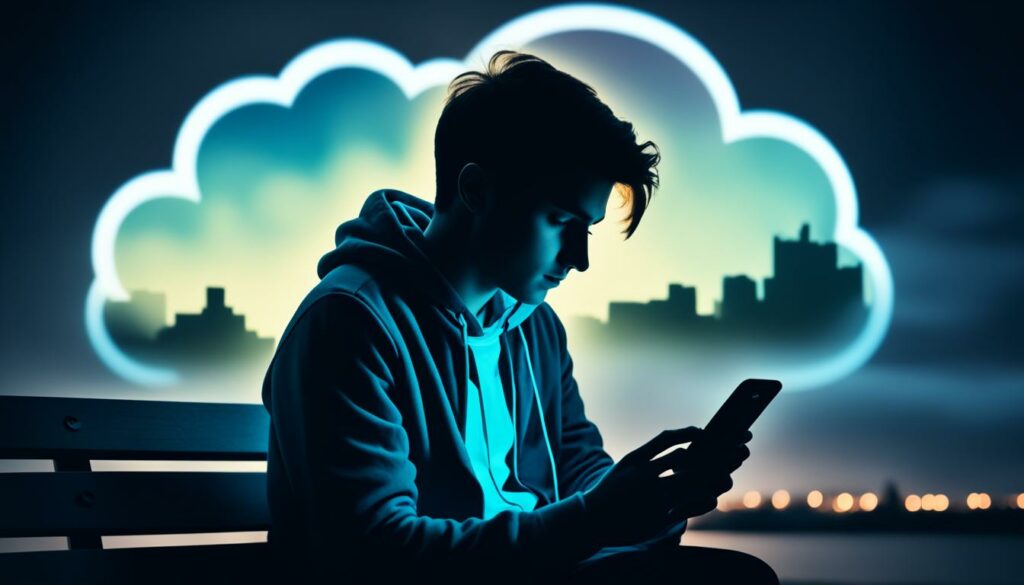
Psychological research has shed light on the impact of social media on youth mental health. Studies have shown that rates of depression, anxiety, and suicide have been on the rise among young people, even before the COVID-19 pandemic. The influence of social media on youth mental health is a complex issue, influenced by various factors such as the type of content consumed, the amount of time spent online, and individual vulnerabilities.
The adolescent brain is particularly vulnerable to the effects of social media. During this period of development, brain regions associated with seeking attention and seeking reinforcement from peers become more sensitive. At the same time, regions responsible for self-control and decision-making are still developing. This imbalance can influence young people’s behavior, including their use of social media and reactions to online content.
Research has also highlighted the impact of social media on life satisfaction. Excessive use of social media has been associated with negative outcomes such as decreased well-being, lower self-esteem, and increased feelings of loneliness and social isolation. However, it is worth noting that social media can also provide a sense of belonging and social connection, particularly for young people who may feel marginalized or isolated offline.
Digital literacy skills play a crucial role in navigating social media safely. Young people need to understand how to critically evaluate information, identify misinformation or biased content, and protect their personal information online. Developing these skills can help mitigate the potential harms of social media use.
| Positive Outcomes of Social Media | Harms of Social Media |
|---|---|
| 1. Access to support networks and online communities. | 1. Exposure to problematic content, including self-harm, eating disorders, and harmful behaviors. |
| 2. Opportunity for self-expression and creativity. | 2. Increased risk of cyberbullying and online harassment. |
| 3. Potential for educational and informational content. | 3. Comparison and unrealistic standards of beauty and success. |
| 4. Connection with others who share similar interests. | 4. Potential negative impact on body image and self-esteem. |
| 5. A platform for advocacy and raising awareness. | 5. Decreased privacy and increased vulnerability to online predators. |
It is crucial to be mindful of young people’s interaction with problematic material on social media platforms. Exposure to self-harm, eating disorder, or harmful content can have a detrimental effect on mental health, particularly for individuals who are already vulnerable.
In conclusion, social media has become an integral part of youth culture, with both positive and negative impacts on mental health. Understanding the research findings can help inform strategies for promoting responsible and safe social media use among young people.
The Benefits of Teen Social Media Use
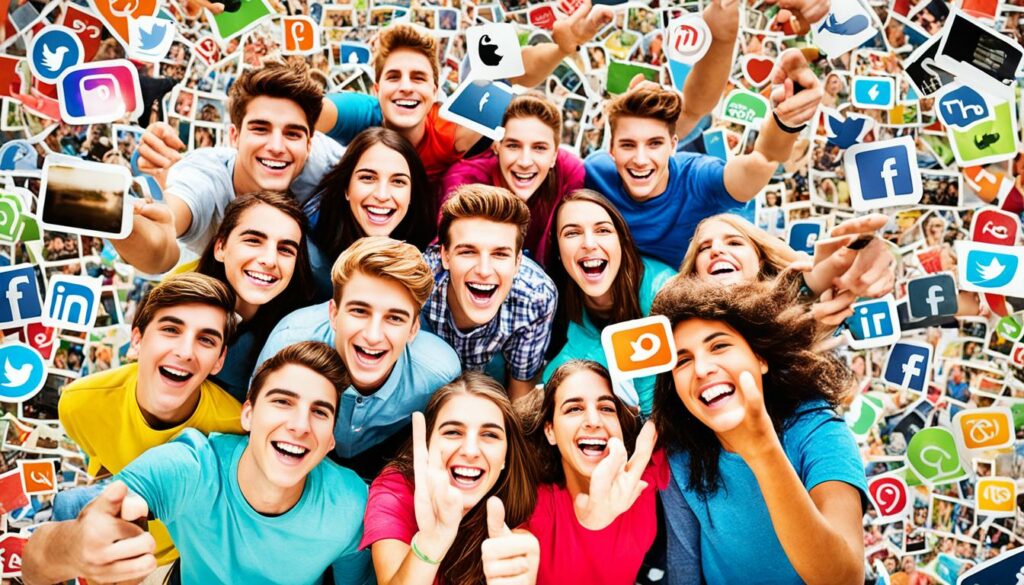
Despite the risks, there are numerous benefits to teenagers using social media. It provides a platform for social connection, allowing teenagers to maintain and form friendships with people from different parts of the world. Through social media, teenagers can bridge geographical barriers and engage in meaningful conversations with individuals who share similar interests and experiences. This social connection fosters a sense of belonging and promotes positive socialization.
Furthermore, social media offers teenagers opportunities for expanding their knowledge and interests. They can join online communities, follow educational pages, and access a wealth of information on various subjects. This exposure not only broadens their understanding but also encourages them to explore new topics, hobbies, and areas of personal growth.
Social media also plays a crucial role in developing thinking and writing skills among teenagers. By sharing their thoughts, opinions, and experiences, they can practice articulating ideas effectively. Writing and engaging in discussions on social media help teenagers hone their communication skills and enhance their critical thinking abilities. They learn to express themselves coherently and respectfully, contributing to the development of their overall communication prowess.
Another significant benefit of teen social media use is the ability to connect with others who share similar interests and passions. Online communities centered around specific hobbies, music genres, sports, or academic fields allow teenagers to find like-minded individuals. Connecting with others over shared interests not only fosters a sense of camaraderie but also provides teenagers with a space to learn from and inspire one another.
In addition to these benefits, social media platforms enable teenagers to stay informed about current events and issues. They can follow news outlets, organizations, and influential figures who share valuable information. Staying updated on current events is not only intellectually stimulating but also helps teenagers develop a broader perspective of the world around them.
“Social media has opened up a whole new world of opportunities for teenagers. It allows them to connect with people from different backgrounds and interests, expand their knowledge, and develop essential skills for the digital age.”
The Risks of Teen Social Media Use
While social media has become an integral part of many teenagers’ lives, it comes with inherent risks that parents and guardians should be aware of. Understanding these risks can help ensure the safe and responsible use of social media platforms by adolescents.
Potential Risks Associated with Teen Social Media Use
Here are some of the key risks that teenagers may encounter when using social media:
- Sharing Personal Information: Teens may unintentionally share personal information, such as their full names, addresses, or phone numbers, which can put their privacy and safety at risk.
- Exposure to Inappropriate Content: Social media platforms contain a vast amount of information, including potentially harmful or inappropriate content, such as cyberbullying, hate speech, or explicit material.
- Mental Health Risks: Excessive use of social media can contribute to mental health issues, including depression, anxiety, low self-esteem, and body image concerns.
- Cyberbullying: The anonymity provided by social media platforms can facilitate cyberbullying, leading to emotional distress and potential long-term psychological harm for the victims.
- Negative Impacts on Body Image and Self-esteem: Constant exposure to filtered and curated content on social media can distort teenagers’ perceptions of beauty standards, leading to negative body image and diminished self-esteem.
- Peer Influence on Risky Behaviors: Peers on social media can exert influence on teenagers, encouraging risky behaviors such as substance abuse, self-harm, or participating in dangerous challenges.
- Addiction to Social Media: Excessive use of social media can lead to addiction, causing teenagers to prioritize online interactions over real-world relationships and activities.
It is essential for both parents and teenagers to be aware of these risks and take appropriate measures to mitigate them. Open communication, education, and responsible guidelines can help teenagers navigate the digital landscape safely.
Quotes from Experts
“Teenagers need to be cautious about what they share on social media. Oversharing personal information can expose them to privacy risks and make them targets for online predators.” – Dr. Emily Johnson, Child Psychologist
“Exposure to inappropriate content on social media can have a significant impact on teenagers’ mental health. Parents need to be involved and proactive in guiding their children’s online experiences.” – Sarah Baker, Cybersecurity Expert
Comparing Risks of Teen Social Media Use
| Risks | Impact | Preventive Measures |
|---|---|---|
| Sharing Personal Information | Potential Privacy and Safety Concerns | Teach teens about online privacy and encourage them to limit the personal information they share. |
| Exposure to Inappropriate Content | Harmful Effects on Mental Well-being | Discuss the importance of critical thinking, responsible decision-making, and reporting inappropriate content. |
| Mental Health Risks | Increased Risk of Depression, Anxiety, and Low Self-esteem | Promote a healthy balance between online and offline activities, encourage self-care, and foster open conversations about mental health. |
| Cyberbullying | Emotional Distress and Long-term Psychological Harm | Advise teens to report bullying incidents, practice positive online behavior, and seek support from trusted adults. |
| Negative Impacts on Body Image and Self-esteem | Distorted Perceptions of Beauty Standards | Encourage discussions on media literacy, self-acceptance, and promoting positive body image. |
| Peer Influence on Risky Behaviors | Involvement in Dangerous Activities | Foster strong offline relationships, encourage independent critical thinking, and emphasize the importance of making responsible decisions. |
| Addiction to Social Media | Detrimental Effects on Health and Well-being | Establish screen time limits, encourage offline activities, and model healthy tech usage as parents or guardians. |
Tips for Parents on Teen Social Media Monitoring and Guidance
As parents, it is crucial to be actively involved in monitoring and guiding your teen’s social media activities. By adopting a proactive approach, you can help ensure their safety and well-being in the complex online world. Here are some valuable tips to assist you in navigating this digital landscape:
- Set clear guidelines and boundaries: Establish rules regarding internet use, including time limits and appropriate content. Encourage a healthy balance between online and offline activities.
- Engage in open communication: Create an environment where your teen feels comfortable discussing social media experiences. Encourage them to come to you with any concerns or questions they may have.
- Become informed about social media platforms: Stay updated on the different social media platforms your teen uses. Familiarize yourself with their features, privacy settings, and potential risks.
- Teach responsible online behavior: Educate your teen about the importance of being mindful and respectful while engaging online. Discuss the potential consequences of sharing personal information and the power of digital permanence.
- Guide your teen in navigating social media safely: Show them how to manage friend requests, adjust privacy settings, and report any inappropriate content or behavior. Encourage them to think critically and question information they come across.
Remember, being actively involved in your teen’s online life is key to promoting their digital well-being. By monitoring their social media activities, setting guidelines, and fostering open communication, you can equip your teen with the necessary skills to navigate social media responsibly.
Quote:
“Engage in open communication and educate your teen about the potential risks and responsible online behavior.”
Empower your teen with the knowledge and guidance they need to make informed decisions and develop healthy online habits. By working together, you can create a safe and positive online experience for your teen.
| Internet Safety Tips for Parents | Guidelines for Teen Social Media Use |
|---|---|
| 1. Communicate openly with your teen about internet safety. | 1. Set clear guidelines on the use of social media platforms. |
| 2. Keep yourself informed about the latest online trends and risks. | 2. Encourage responsible sharing and discourage oversharing of personal information. |
| 3. Utilize parental control software to monitor your teen’s online activities. | 3. Discuss the potential consequences of cyberbullying and inappropriate content. |
| 4. Foster open communication and provide a safe space for your teen to discuss any concerns. | 4. Encourage critical thinking and fact-checking when consuming online content. |
| 5. Stay vigilant against online predators and educate your teen about online safety. | 5. Help your teen understand the importance of maintaining a positive digital reputation. |
Conclusion
In conclusion, understanding why teens use social media is crucial in navigating the potential benefits and risks associated with its use. Social media offers opportunities for connection, self-expression, and learning, allowing teenagers to build social networks and explore their interests. However, it also presents risks such as exposure to harmful content, cyberbullying, and negative impacts on mental health.
Parental guidance and monitoring play a crucial role in promoting safe and responsible social media use among teens. By setting guidelines, monitoring activities, and maintaining open communication, parents can help their teens navigate this digital landscape. It is important to strike a balance between allowing teens to enjoy the benefits of social media and ensuring their safety and well-being.
By being actively involved in their teens’ social media use, parents can provide guidance and promote positive online behavior. This includes teaching responsible online behavior, discussing the potential risks and consequences, and being knowledgeable about the various social media platforms and their features. Ultimately, with parental support and monitoring, teens can develop healthy online habits and make informed decisions in their social media interactions.
It is important for parents to remember that promoting safe and responsible social media use is an ongoing process. As technology evolves and new platforms emerge, it is crucial to stay informed and adapt guidelines accordingly. By prioritizing the well-being of their teens and fostering open communication, parents can help them navigate the digital landscape confidently and responsibly.
FAQ
Why do teens use social media?
Teens use social media for various reasons, including connecting with friends, expressing themselves, staying informed, and exploring shared interests.
What are the benefits of social media for teenagers?
Social media provides a platform for social connection, positive socialization, expanding knowledge and interests, developing thinking and writing skills, and staying informed about current events.
What is the impact of social media on adolescent development?
The impact of social media on adolescent development can vary, but it can influence social connection, self-expression, learning, and mental health.
What are the risks of social media for teenagers?
Risks of social media for teenagers include sharing personal information, exposure to inappropriate content, cyberbullying, negative impacts on mental health, and the potential for addiction.
What are the advantages and disadvantages of teen social media use?
The advantages of teen social media use include social connection and learning opportunities, while the disadvantages encompass privacy and safety concerns, exposure to inappropriate content, and potential mental health risks.
What are the reasons behind increased teen social media engagement?
Factors such as the need for social connection, self-expression, staying informed, and a sense of identity exploration contribute to increased teen social media engagement.
How does social media impact teen mental health?
Social media can have both positive and negative effects on teen mental health, including support networks, coping strategies, distractions, exposure to biased information, cyberbullying, and unrealistic views of others’ lives and bodies.
What are some strategies to promote safe social media use among teens?
Strategies to promote safe social media use among teens include setting rules and limits, being a positive role model, managing challenging behaviors, turning on privacy settings, monitoring and reviewing teen accounts, having regular talks about social media, and encouraging face-to-face contact with friends.
How can parents monitor teen social media activities?
Parents can monitor teen social media activities by setting guidelines and boundaries, engaging in open communication, being knowledgeable about social media platforms, teaching responsible online behavior, and regularly reviewing their teen’s accounts.
What does research reveal about the impact of social media on youth mental health?
Research suggests that social media can impact youth mental health, including rates of depression, anxiety, and suicide. The adolescent brain is particularly vulnerable to the effects of social media.
What are the benefits of social media for teenagers?
Social media offers opportunities for social connection, positive socialization, expanding knowledge and interests, developing thinking and writing skills, and staying informed about current events.
What are the risks of social media for teenagers?
Risks of social media for teenagers include sharing personal information, exposure to inappropriate content, mental health risks such as depression and low self-esteem, cyberbullying, and peer influence on risky behaviors.
How can parents monitor and guide teen social media activities?
Parents can monitor and guide teen social media activities by setting guidelines and boundaries, maintaining open communication, being informed about social media platforms, teaching responsible online behavior, and seeking professional help if needed.
What is the importance of understanding why teens use social media?
Understanding why teens use social media is important to navigate the potential benefits and risks associated with its use, and to promote safe and responsible social media use among teens with parental guidance and monitoring.

